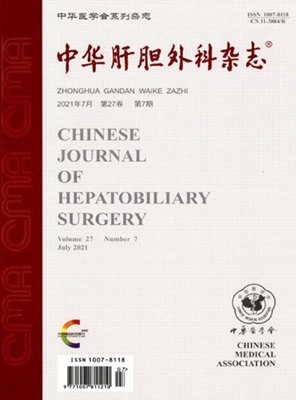Efficacy of intrahepatic cholangiocarcinoma treated with chemotherapy through portal vein pump after radical surgery
Q4 Medicine
引用次数: 0
Abstract
Objective To evaluate the clinical application value of portal vein implantation pump for chemotherapy in patients with intrahepatic cholangiocarcinoma (ICC)after radical surgery. Methods The clinical data of 97 patients with ICC who underwent radical surgery in Henan People's Hospital from June 2012 to June 2016 were retrospectively analyzed. Results Among the 97 patients, 14 patients received portal venous pump chemotherapy (portal group), 33 patients received peripheral venous chemotherapy (peripheral group), and 50 patients did not receive postoperative chemotherapy (control group). There were no statistically significant differences in gender and age between the three groups. The results of survival analysis indicated that the disease-free survival (DFS) period and overall survival (OS) time in the portal group and the peripheral group were significantly better than that in control group (both P 0.05), for the control of intrahepatic metastasis, portal vein pump chemotherapy was better than that of systemic chemotherapy via peripheral vein, and almost all side effects of chemotherapy in the portal group were lower than those in the peripheral group. Conclusion Portal vein pump chemotherapy can improve the prognosis of intrahepatic bile duct patients, especially for the control of intrahepatic metastasis, and can reduce systemic side effects of chemotherapy. Key words: Bile duct neoplasms; Intrahepatic cholangiocarcinoma; Portal vein pump; Prognosis; Chemotherapy门静脉泵化疗治疗肝内胆管癌根治术后疗效观察
目的评价门静脉灌注泵在肝内胆管癌根治术后化疗中的临床应用价值。方法回顾性分析2012年6月至2016年6月在河南省人民医院接受根治性手术的97例ICC患者的临床资料。结果97例患者中,14例接受门静脉泵化疗(门静脉组),33例接受外周静脉化疗(外周组),50例未接受术后化疗(对照组)。三组之间在性别和年龄方面没有统计学上的显著差异。生存分析结果表明,门静脉组和外周组的无病生存期(DFS)和总生存时间(OS)均明显优于对照组(均P<0.05),在控制肝内转移方面,门静脉泵化疗优于外周静脉全身化疗,门脉组化疗的几乎所有副作用均低于外周组。结论门静脉泵化疗可改善肝内胆管患者的预后,尤其对控制肝内转移有重要作用,并可减少化疗的全身副作用。关键词:胆管肿瘤;肝内胆管癌;门静脉泵;预后;化学疗法
本文章由计算机程序翻译,如有差异,请以英文原文为准。
求助全文
约1分钟内获得全文
求助全文
来源期刊

中华肝胆外科杂志
Medicine-Gastroenterology
CiteScore
0.20
自引率
0.00%
发文量
7101
期刊介绍:
Chinese Journal of Hepatobiliary Surgery is an academic journal organized by the Chinese Medical Association and supervised by the China Association for Science and Technology, founded in 1995. The journal has the following columns: review, hot spotlight, academic thinking, thesis, experimental research, short thesis, case report, synthesis, etc. The journal has been recognized by Beida Journal (Chinese Journal of Humanities and Social Sciences).
Chinese Journal of Hepatobiliary Surgery has been included in famous databases such as Peking University Journal (Chinese Journal of Humanities and Social Sciences), CSCD Source Journals of China Science Citation Database (with Extended Version) and so on, and it is one of the national key academic journals under the supervision of China Association for Science and Technology.
 求助内容:
求助内容: 应助结果提醒方式:
应助结果提醒方式:


